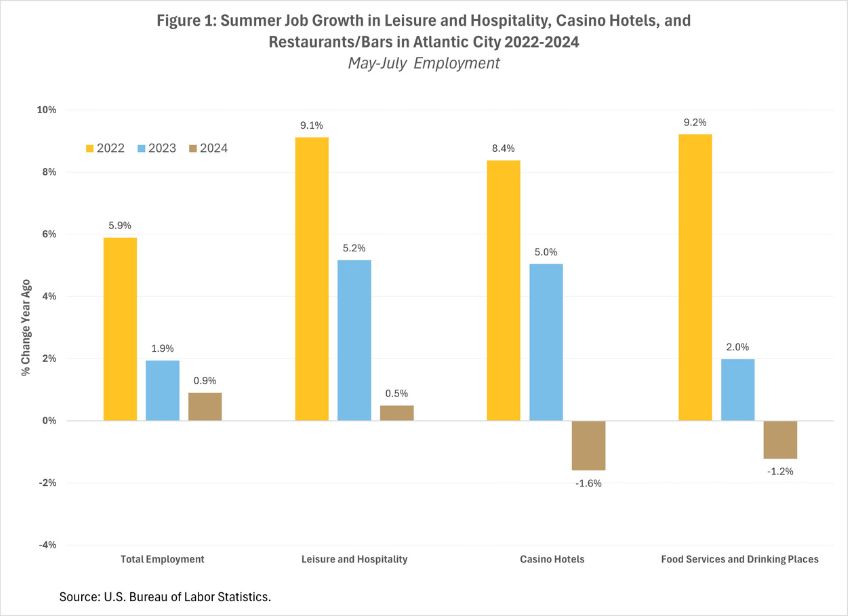An Early Employment-Based Assessment of the Summer 2024 Shore Season

By Oliver D. Cooke, Ph.D. - Associate Professor of Economics, William J. Hughes Center Policy Scholar School of Social and Behavioral Sciences, Stockton University
Oliver D. Cooke, Ph.D.
Associate Professor of Economics,
Stockton University
While it is too early to pass final judgment on the Summer 2024 shore season, employment figures for the May-July period suggest either that Atlantic City employers were rather cautious in their hiring decisions this spring and early summer or faced a tight labor market.
Figure 1 shows year-over-year employment growth for a group of key industries as well
as total employment in Atlantic City over the past three summers. (The rates of growth
use average employment for the May-July period.[1]) Total employment in the Atlantic City metropolitan area was up just 0.9 percent
year-on-year this summer, which represented a significant slowing relative to the
overall pace of job growth in summer 2023 which came in at 1.9 percent. Job growth
in the key leisure and hospitality sector was a mere 0.5 percent this summer, well
below its robust 2023 pace of 5.2 percent. Perhaps most noteworthy, employment in
casino hotels and restaurants/bars was down 1.6 and 1.2 percent, respectively, compared
to summer 2023 levels.
The question of whether this summer’s slower pace of job growth in leisure and hospitality
reflects caution by this sector’s managers or a tight labor market seems clear in
light of the data we have through June (the most recent month for which metro area
labor force data are currently available). Average unemployment in Atlantic City for
the most recent May-June period stood at a seasonally adjusted 6.1 percent. This was
above its 5.9 percent reading for the comparable period in 2023. Meanwhile, the labor
force was up 0.5 percent year-on-year. (By way of comparison, the unemployment rate
in Ocean City was down this summer relative to 2023, despite a significant increase
in the labor force.) All this suggests that this summer’s tepid hiring in Atlantic
City was likely the product of wary hiring managers and business owners. Indeed, this
would seem to be consistent with the national trend. The most recent jobs report showed
that the national pace of hiring slowed markedly in July.
In addition to this slowing, several so-called recession warning signs have been triggered recently, including the Sahm Rule. These warnings have generated significant debate among economists and market watchers over the broader health of the national economy. By many standard metrics, including real GDP growth, unemployment and consumer confidence (which just rose to a six-month high), the economy continues to be in reasonably good health. Moreover, the Federal Reserve just signaled that it will begin reducing its benchmark interest rate in September — a clear sign it is satisfied with the inflation trend. (The Fed’s preferred inflation metric, core Personal Consumption Expenditure Price Index (PCE), stood at 2.6 percent in June.) A presidential election meanwhile will continue to unfold over the fall. The confluence of all these factors will complicate efforts to gauge the national economy as well as local and regional ones over the next few months.
[1] Most employers try to lock-in their summer staffs in May ahead of the summer’s annual Memorial Day kickoff weekend. Staffing levels traditionally remain steady through July before beginning to trend down in mid- to late-August as families wrap-up vacations and prepare to head back to school. Many college-students, who are an important part of the summer Shore workforce, also head back to school in mid- to late-August.
Join Dr. Cooke and a panel of experts for a review
of the Summer 2024 tourism season!





